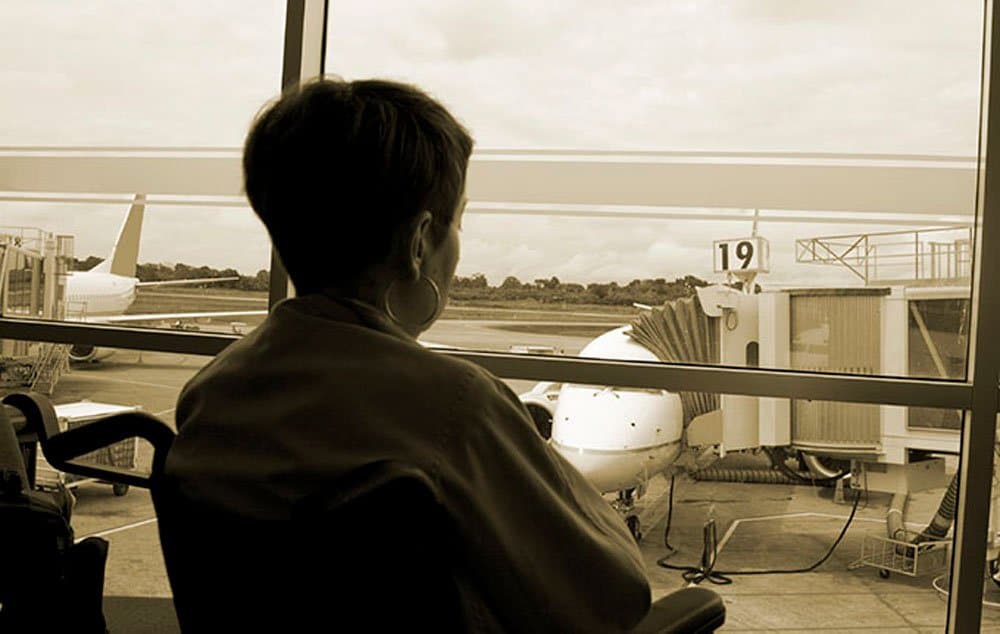Even the most infrequent flyer knows that air travel these days is fraught with delays. The seasoned traveler has a store of tales of cancelled flights, missed connections and late arrivals – stories so common it’s hard to find an audience for them.
But imagine if once you finally arrived at your destination, you had to add another 30 minutes or so to the ordeal, sitting on the plane, waiting to get off.
That’s what can happen to passengers who are wheelchair bound.
Just ask Julien Henley, a St. Thomas man who is paralyzed from the waist down and who travels frequently both for medical treatment and for volunteer advocacy work.
There was the time airline staff told him his wheelchair wasn’t going to make it into cargo for his flight, but they’d send it on the next flight, many hours later. Or the time he exited a plane, expecting to get into his wheelchair plane side only to discover it was missing; another passenger had taken it when it was off-loaded.
Henley has encountered problems on many airlines and at many destinations. But nothing beats home for complicating the already problematic.
“Coming to St. Thomas has been a nightmare,” Henley said. “A lot of times I’m stuck on the plane, and it’s a long, long wait.”
What he’s waiting for is the wheelchair lift, since flights coming to Cyril King Airport on St. Thomas -as well as to Henry Rohlsen Airport on St. Croix – have no presence on the second floor of the terminal buildings and consequently don’t use jet bridges. Instead, passengers make their way down a long flight of stairs, juggling carry-on luggage. And anyone who can’t manage that, has to be transported to the ground via lift. (Reverse the process for getting on the plane.)
Disembarkation is often a wait, but Henley recounted one incident that was outstanding. His flight from Miami arrived late on St. Thomas. He sat on the plane while all the other passengers got off. Regulations dictate that the flight crew remains on board till all the passengers leave, so they waited with him. The maintenance crew came, cleaned the plane around him, and left. Still no lift.
It seems the man who operated the regular lift had gone home. Eventually, Henley was taken off the plane via the lift on the catering truck.
Henley had praise for airline and airport staff who try to accommodate disabled travelers. He noted that the V.I. Port Authority recently purchased additional wheelchair lifts.
There are now three lifts on St. Thomas, which handles the most passengers, and two on St. Croix, according to Monifa Morreno Brathwaite, public relations officer for the Port Authority. The airlines have responsibility for providing wheelchairs.
Advocates for the disabled say they appreciate attempts to improve lift service, but really they’d like not to need it at all. They’d rather see jet bridges.
“It’s an inclusive awareness issue,” said Amelia Headley Lamont, executive director for the Disability Rights Center of the Virgin Islands. “People are hoisted up on a plane, and that’s not inclusive … It’s not a dignified way to travel.”
Henley concurred.
“It would take care of I’d say 50 percent of the problem” if there were jet bridges at the airports, he said.
Besides, they say, it would be good for other travelers as well and make the Virgin Islands more competitive in tourism since some other Caribbean airports already feature jet bridges.
“We are really, really at a disadvantage if we continue in this vein,” Lamont said.
“It’s time for us to step it up,” Henley said.
It’s not clear whether many travelers agree that the need is significant. Luanna Wheatley of the V.I. Tourism Department said the department has not received complaints about airline/airport access for the disabled either through its exit surveys or through its informational portal on line.
And while the Port Authority has addressed the need for lifts, it’s not clear whether it views jet bridges as a necessity. Brathwaite referred questions about possible plans to upgrade the existing terminals to Port Authority executive director Carlton Dowe, but he did not respond to requests for comment.
Meanwhile, the Disability Rights Center has launched a campaign to raise awareness about the responsibility of air carriers and airports to accommodate disabled travelers.
The national Aircraft Carrier Access Act bans discrimination of disabled passengers and requires airlines to assist them. The law applies to all carriers with 19 or more passenger seats. The Department of Transportation enforces the ACAA and can fine airlines for violations.
The Disability Rights Center is circulating a petition in support of the act and of equal access in the Virgin Islands. The petition is online at http://drcvi.org/acaa-petition
Source: St. Thomas Source



